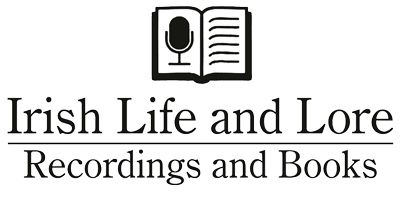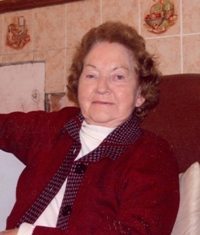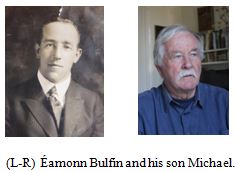Elizabeth Ryan is from Pullough which is located near the canal. Her family lived in a thatched brick house and in the garden they grew their own vegetables. Her father was a good thatcher and worked on the boats on the Grand Canal. Elizabeth recalls some of the families who lived nearby in what she describes as a close-knit community. Her school days are also recalled. Her father, Joseph Dunican, came from the Island at Rahan, and her mother was Margaret Murray who came from Pullough. Joseph worked on the boats, bringing the beer from Dublin to Shannon Harbour, and he would be away for a few days at a time, Elizabeth says. Her mother died in 1956 when her youngest child was 16. Elizabeth started work, with her sister, footing turf. She remembers that payment was good the working hours were from 8 in the morning until 5 in the evening. Working on the bog was very pleasant in the summer, she recalls. After some years a carnival in Ferbane was set up, and she would cycle off in the evenings to enjoy the showbands and see people such as Dickie Rock and Brendan Bowyer. During the winter time, the main occupations were reading and knitting, and obviously there was neither electricity nor television. The radio was powered by batteries. Elizabeth recalls seeing the houses all lit up when the electricity arrived, and says that prior to this, candles and a Tilley lamp was used. However, there was never a problem with regard to heat due to the abundance of turf and she remembers thatched houses as being warm places. The work that the woman did in the home is discussed, including cake and bread-making made on the fire. The washing was done in a tub, using a washboard, and dried on the line. The regular diet consisted of their own vegetables, potatoes and home-cured bacon. The canal water was used for personal washing and for washing clothes, but a well behind the house was used for drinking water, as was a brook a cycle away. She describes the irons which were heated in the fire and put into the iron body to iron clothes. No work was carried out on a Sunday. The religious practices are remembered and described. She says that there were no stations in their house . A light to the Sacred Heart shone on the wall. There were four Dunican girls. One of them married a man who worked in Tullamore and another married a man who worked in the brewery in Dublin. Elizabeth married Jim Ryan who worked in Boora and Leamonaghan for Bord na Móna, and she recalls the day of this death. She had four children to look after and she was helped by her brother who lived nearby. She explains that she knew Jim, who was from Charleville in Co. Cork, for most of her life. He had started work recruiting men for Bord na Móna from all around the country, and a camp was built to accommodate them in Offaly. Elizabeth recalls the canteen that was set up in the camp and the employment it gave. She remembers Jim discussing the poor food available during the Emergency years, and he told her about cycling to GAA matches at weekends which was the only entertainment available all week. Although the Dunican family grew their own vegetables, tea was scarce and Elizabeth says her father used to buy it on the black market. He also brought home coffee which she thinks was made from chicory. She recalls the coupons required during rationing and says that they would cycle to Tullamore to the drapers such as McFaddens. Elizabeth’s mother had her own sewing machine and would make all their clothes. Elizabeth and her brother John, who lives in London, are the only survivors of the nine siblings in the family. When John was 18 he started working on the buildings in England and learned carpentry, setting up in business with three others. They all worked hard as there was no social welfare available in those days. Her father Joseph worked mainly on the Grand Canal, though sometimes on the Barrow line, for CIÉ. Elizabeth says that the barges usually came down at night, and turf was also brought up to Dublin by private boats to be sold. Each house had its own patch of bog, she explains. Elizabeth now suffers from arthritis and she describes how the condition developed due to the hard work she has done all her life. She talks about a book of photographs that brings back memories of life on the turf bog. She recalls the bicycle as the main mode of transport for herself and her friends and says that they would hire a car to get to the dances. Their favourite place was Roseland Ballroom in Moate. Many of the men who came in to work for Bord na Móna married locally and settled down in the area, many of them lived around Kilcormac and Ferbane. Elizabeth remembers the Irish speakers from Galway, and recalls some of as being very talented musicians also. She talks about people today who have every convenience in the house and are bored at the same time, remarking that people in earlier days worked very hard. She discusses her mother’s family, the Murrays and says that her Aunt Mary also married a man named Dunican. The houses along the canal were of a good size, she says, having four bedrooms. Joseph Dunican came from the Island at Rahan and both he and his wife are buried in the Island. Joseph was famed for his thatching skills in the area. Elizabeth has clear memories of the men singing and whistling while driving the boat as they went down the canal and the river by night.

Elizabeth Ryan (née Dunican) (b. 1929)
Elizabeth Ryan (née Dunican) (b. 1929)
€10.00 – €20.00
Additional information
| Type: | MP3 |
|---|---|
| Audio series: | The Offaly Collection: memories of early industrial peat harvesting at Turraun |
| Bitrate: | 128 kbps |
| Download time limit: | 48 hours |
| File size(s): | 49.6 MB |
| Number of files: | 1 |
| Product ID: | CDOF09-05 |
| Subject: | Early peat harvesting |
| Recorded by: | Maurice O’Keeffe – Irish Life and Lore |







